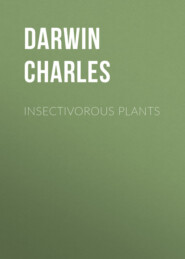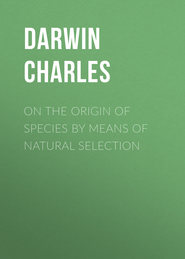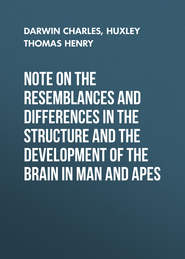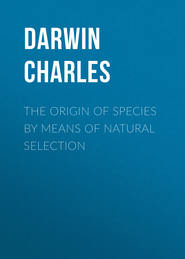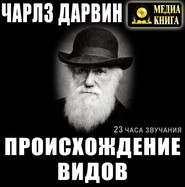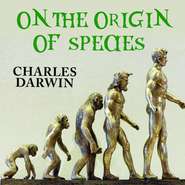По всем вопросам обращайтесь на: info@litportal.ru
(©) 2003-2024.
✖
Life and Letters of Charles Darwin — Volume 1
Настройки чтения
Размер шрифта
Высота строк
Поля
My dear Hooker,
I should have written before now, had I not been almost continually unwell, and at present I am suffering from four boils and swellings, one of which hardly allows me the use of my right arm, and has stopped all my work, and damped all my spirits. I was much disappointed at missing my trip to Kew, and the more so, as I had forgotten you would be away all this month; but I had no choice, and was in bed nearly all Friday and Saturday. I congratulate you over your improved prospects about India (Sir J. Hooker left England on November 11, 1847, for his Himalayan and Tibetan journey. The expedition was supported by a small grant from the Treasury, and thus assumed the character of a Government mission.), but at the same time must sincerely groan over it. I shall feel quite lost without you to discuss many points with, and to point out (ill-luck to you) difficulties and objections to my species hypotheses. It will be a horrid shame if money stops your expedition; but Government will surely help you to some extent...Your present trip, with your new views, amongst the coal-plants, will be very interesting. If you have spare time, BUT NOT WITHOUT, I should enjoy having some news of your progress. Your present trip will work well in, if you go to any of the coal districts in India. Would this not be a good object to parade before Government; the utilitarian souls would comprehend this. By the way, I will get some work out of you, about the domestic races of animals in India...
CHARLES DARWIN TO L. JENYNS (BLOMEFIELD). Down [1847].
Dear Jenyns,
("This letter relates to a small Almanack first published in 1843, under the name of 'The Naturalists' Pocket Almanack,' by Mr. Van Voorst, and which I edited for him. It was intended especially for those who interest themselves in the periodic phenomena of animals and plants, of which a select list was given under each month of the year.
"The Pocket Almanack contained, moreover, miscellaneous information relating to Zoology and Botany; to Natural History and other scientific societies; to public Museums and Gardens, in addition to the ordinary celestial phenomena found in most other Almanacks. It continued to be issued till 1847, after which year the publication was abandoned." — From a letter from Rev. L. Blomefield to F. Darwin.)
I am very much obliged for the capital little Almanack; it so happened that I was wishing for one to keep in my portfolio. I had never seen this kind before, and shall certainly get one for the future. I think it is very amusing to have a list before one's eyes of the order of appearance of the plants and animals around one; it gives a fresh interest to each fine day. There is one point I should like to see a little improved, viz., the correction for the clock at shorter intervals. Most people, I suspect, who like myself have dials, will wish to be more precise than with a margin of three minutes. I always buy a shilling almanack for this SOLE end. By the way, YOURS, i.e., Van Voorst's Almanack, is very dear; it ought, at least, to be advertised post-free for the shilling. Do you not think a table (not rules) of conversion of French into English measures, and perhaps weights, would be exceedingly useful; also centigrade into Fahrenheit, — magnifying powers according to focal distances? — in fact you might make it the more useful publication of the age. I know what I should like best of all, namely, current meteorological remarks for each month, with statement of average course of winds and prediction of weather, in accordance with movements of barometer. People, I think, are always amused at knowing the extremes and means of temperature for corresponding times in other years.
I hope you will go on with it another year. With many thanks, my dear Jenyns,
Yours very truly, CHARLES DARWIN.
CHARLES DARWIN TO J.D. HOOKER. Down, Sunday [April 18th, 1847].
My dear Hooker,
I return with many thanks Watson's letter, which I have had copied. It is a capital one, and I am extremely obliged to you for obtaining me such valuable information. Surely he is rather in a hurry when he says intermediate varieties must almost be necessarily rare, otherwise they would be taken as the types of the species; for he overlooks numerical frequency as an element. Surely if A, B, C were three varieties, and if A were a good deal the commonest (therefore, also, first known), it would be taken as the type, without regarding whether B was quite intermediate or not, or whether it was rare or not. What capital essays W would write; but I suppose he has written a good deal in the 'Phytologist.' You ought to encourage him to publish on variation; it is a shame that such facts as those in his letter should remain unpublished. I must get you to introduce me to him; would he be a good and sociable man for Dropmore? (A much enjoyed expedition made from Oxford — when the British Association met there in 1847.) though if he comes, Forbes must not (and I think you talked of inviting Forbes), or we shall have a glorious battle. I should like to see sometime the war correspondence. Have you the 'Phytologist,' and could you sometime spare it? I would go through it quickly...I have read your last five numbers (Of the Botany of Hooker's 'Antarctic Voyage.'), and as usual have been much interested in several points, especially with your discussions on the beech and potato. I see you have introduced several sentences against us Transmutationists. I have also been looking through the latter volumes of the 'Annals of Natural History,' and have read two such soulless, pompous papers of — , quite worthy of the author...The contrast of the papers in the "Annals" with those in the "Annales" is rather humiliating; so many papers in the former, with short descriptions of species, without one word on their affinities, internal structure, range or habits. I am now reading — , and I have picked out some things which have interested me; but he strikes me as rather dullish, and with all his Materia Medica smells of the doctor's shop. I shall ever hate the name of the Materia Medica, since hearing Duncan's lectures at eight o'clock on a winter's morning — a whole, cold breakfastless hour on the properties of rhubarb!
I hope your journey will be very prosperous. Believe me, my dear Hooker,
Ever yours, C. DARWIN.
P.S. — I think I have only made one new acquaintance of late, that is R. Chambers; and I have just received a presentation copy of the sixth edition of the 'Vestiges.' Somehow I now feel perfectly convinced he is the author. He is in France, and has written to me thence.
CHARLES DARWIN TO J.D. HOOKER. Down [1847?].
...I am delighted to hear that Brongniart thought Sigillaria aquatic, and that Binney considers coal a sort of submarine peat. I would bet 5 to 1 that in twenty years this will be generally admitted (An unfulfilled prophecy.); and I do not care for whatever the botanical difficulties or impossibilities may be. If I could but persuade myself that Sigillaria and Co. had a good range of depth, i.e., could live from 5 to 100 fathoms under water, all difficulties of nearly all kinds would be removed (for the simple fact of muddy ordinary shallow sea implies proximity of land). [N.B. — I am chuckling to think how you are sneering all this time.] It is not much of a difficulty, there not being shells with the coal, considering how unfavourable deep mud is for most Mollusca, and that shells would probably decay from the humic acid, as seems to take place in peat and in the BLACK moulds (as Lyell tells me) of the Mississippi. So coal question settled — Q.E.D. Sneer away!
Many thanks for your welcome note from Cambridge, and I am glad you like my alma mater, which I despise heartily as a place of education, but love from many most pleasant recollections...
Thanks for your offer of the 'Phytologist;' I shall be very much obliged for it, for I do not suppose I should be able to borrow it from any other quarter. I will not be set up too much by your praise, but I do not believe I ever lost a book or forgot to return it during a long lapse of time. Your 'Webb' is well wrapped up, and with your name in large letters OUTSIDE.
My new microscope is come home (a "splendid plaything," as old R. Brown called it), and I am delighted with it; it really is a splendid plaything. I have been in London for three days, and saw many of our friends. I was extremely sorry to hear a not very good account of Sir William. Farewell, my dear Hooker, and be a good boy, and make Sigillaria a submarine sea-weed.
Ever yours, C. DARWIN.
CHARLES DARWIN TO J.D. HOOKER. Down [May 6th, 1847].
My dear Hooker,
You have made a savage onslaught, and I must try to defend myself. But, first, let me say that I never write to you except for my own good pleasure; now I fear that you answer me when busy and without inclination (and I am sure I should have none if I was as busy as you). Pray do not do so, and if I thought my writing entailed an answer from you nolens volens, it would destroy all my pleasure in writing. Firstly, I did not consider my letter as REASONING, or even as SPECULATION, but simply as mental rioting; and as I was sending Binney's paper, I poured out to you the result of reading it. Secondly, you are right, indeed, in thinking me mad, if you suppose that I would class any ferns as marine plants; but surely there is a wide distinction between the plants found upright in the coal-beds and those not upright, and which might have been drifted. Is it not possible that the same circumstances which have preserved the vegetation in situ, should have preserved drifted plants? I know Calamites is found upright; but I fancied its affinities were very obscure, like Sigillaria. As for Lepidodendron, I forgot its existence, as happens when one goes riot, and now know neither what it is, or whether upright. If these plants, i.e. Calamites and Lepidodendron, have VERY CLEAR RELATIONS to terrestrial vegetables, like the ferns have, and are found upright in situ, of course I must give up the ghost. But surely Sigillaria is the main upright plant, and on its obscure affinities I have heard you enlarge.
Thirdly, it never entered my head to undervalue botanical relatively to zoological evidence; except in so far as I thought it was admitted that the vegetative structure seldom yielded any evidence of affinity nearer than that of families, and not always so much. And is it not in plants, as certainly it is in animals, dangerous to judge of habits without very near affinity. Could a Botanist tell from structure alone that the Mangrove family, almost or quite alone in Dicotyledons, could live in the sea, and the Zostera family almost alone among the Monocotyledons? Is it a safe argument, that because algae are almost the only, or the only submerged sea-plants, that formerly other groups had not members with such habits? With animals such an argument would not be conclusive, as I could illustrate by many examples; but I am forgetting myself; I want only to some degree to defend myself, and not burn my fingers by attacking you. The foundation of my letter, and what is my deliberate opinion, though I dare say you will think it absurd, is that I would rather trust, caeteris paribus, pure geological evidence than either zoological or botanical evidence. I do not say that I would sooner trust POOR geological evidence than GOOD organic. I think the basis of pure geological reasoning is simpler (consisting chiefly of the action of water on the crust of the earth, and its up and down movements) than a basis drawn from the difficult subject of affinities and of structure in relation to habits. I can hardly analyze the facts on which I have come to this conclusion; but I can illustrate it. Pallas's account would lead any one to suppose that the Siberian strata, with the frozen carcasses, had been quickly deposited, and hence that the embedded animals had lived in the neighbourhood; but our zoological knowledge of thirty years ago led every one falsely to reject this conclusion.
Tell me that an upright fern in situ occurs with Sigillaria and Stigmaria, or that the affinities of Calamites and Lepidodendron (supposing that they are found in situ with Sigillaria) are so CLEAR, that they could not have been marine, like, but in a greater degree, than the mangrove and sea-wrack, and I will humbly apologise to you and all Botanists for having let my mind run riot on a subject on which assuredly I know nothing. But till I hear this, I shall keep privately to my own opinion with the same pertinacity and, as you will think, with the same philosophical spirit with which Koenig maintains that Cheirotherium-footsteps are fuci.
Whether this letter will sink me lower in your opinion, or put me a little right, I know not, but hope the latter. Anyhow, I have revenged myself with boring you with a very long epistle. Farewell, and be forgiving. Ever yours,
C. DARWIN.
P.S. — When will you return to Kew? I have forgotten one main object of my letter, to thank you MUCH for your offer of the 'Hort. Journal,' but I have ordered the two numbers.
[The two following extracts [1847] give the continuation and conclusion of the coal battle.
"By the way, as submarine coal made you so wrath, I thought I would experimentise on Falconer and Bunbury (The late Sir C. Bunbury, well-known as a palaeobotanist.) together, and it made [them] even more savage; 'such infernal nonsense ought to be thrashed out of me.' Bunbury was more polite and contemptuous. So I now know how to stir up and show off any Botanist. I wonder whether Zoologists and Geologists have got their tender points; I wish I could find out."
"I cannot resist thanking you for your most kind note. Pray do not think that I was annoyed by your letter: I perceived that you had been thinking with animation, and accordingly expressed yourself strongly, and so I understood it. Forfend me from a man who weighs every expression with Scotch prudence. I heartily wish you all success in your noble problem, and I shall be very curious to have some talk with you and hear your ultimatum."]
CHARLES DARWIN TO J.D. HOOKER. (Parts of two letters.) Down [October, 1847].
I congratulate you heartily on your arrangements being completed, with some prospect for the future. It will be a noble voyage and journey, but I wish it was over, I shall miss you selfishly and all ways to a dreadful extent ...I am in great perplexity how we are to meet...I can well understand how dreadfully busy you must be. If you CANNOT come here, you MUST let me come to you for a night; for I must have one more chat and one more quarrel with you over the coal.
By the way, I endeavoured to stir up Lyell (who has been staying here some days with me) to theorise on the coal: his oolitic UPRIGHT Equisetums are dreadful for my submarine flora. I should die much easier if some one would solve me the coal question. I sometimes think it could not have been formed at all. Old Sir Anthony Carlisle once said to me gravely, that he supposed Megatherium and such cattle were just sent down from heaven to see whether the earth would support them; and I suppose the coal was rained down to puzzle mortals. You must work the coal well in India.
Ever yours, C. DARWIN.
CHARLES DARWIN TO J.D. HOOKER. [November 6th, 1847.]
My dear Hooker,
I have just received your note with sincere grief: there is no help for it. I shall always look at your intention of coming here, under such circumstances, as the greatest proof of friendship I ever received from mortal man. My conscience would have upbraided me in not having come to you on Thursday, but, as it turned out, I could not, for I was quite unable to leave Shrewsbury before that day, and I reached home only last night, much knocked up. Without I hear to-morrow (which is hardly possible), and if I am feeling pretty well, I will drive over to Kew on Monday morning, just to say farewell. I will stay only an hour...
CHARLES DARWIN TO J.D. HOOKER. [November, 1847.]
My dear Hooker,
I am very unwell, and incapable of doing anything. I do hope I have not inconvenienced you. I was so unwell all yesterday, that I was rejoicing you were not here; for it would have been a bitter mortification to me to have had you here and not enjoyed your last day. I shall not now see you. Farewell, and God bless you.
Your affectionate friend, C. DARWIN.
I will write to you in India.
[In 1847 appeared a paper by Mr. D. Milne (Now Mr. Milne Home. The essay was published in Transactions of the Edinburgh Royal Society, vol. xvi.), in which my father's Glen Roy work is criticised, and which is referred to in the following characteristic extract from a letter to Sir J. Hooker: ] "I have been bad enough for these few last days, having had to think and write too much about Glen Roy...Mr. Milne having attacked my theory, which made me horribly sick." I have not been able to find any published reply to Mr. Milne, so that I imagine the "writing" mentioned was confined to letters. Mr. Milne's paper was not destructive to the Glen Roy paper, and this my father recognises in the following extract from a letter to Lyell (March, 1847). The reference to Chambers is explained by the fact that he accompanied Mr. Milne in his visit to Glen Roy. "I got R. Chambers to give me a sketch of Milne's Glen Roy views, and I have re-read my paper, and am, now that I have heard what is to be said, not even staggered. It is provoking and humiliating to find that Chambers not only had not read with any care my paper on this subject, or even looked at the coloured map, so that the new shelf described by me had not been searched for, and my arguments and facts of detail not in the least attended to. I entirely gave up the ghost, and was quite chicken-hearted at the Geological Society, till you reassured and reminded me of the main facts in the whole case."
The two following letters to Lyell, though of later date (June, 1848), bear on the same subject: —
"I was at the evening meeting [of the Geological Society], but did not get within hail of you. What a fool (though I must say a very amusing one) — did make of himself. Your speech was refreshing after it, and was well characterized by Fox (my cousin) in three words — 'What a contrast!' That struck me as a capital speculation about the Wealden Continent going down. I did not hear what you settled at the Council; I was quite wearied out and bewildered. I find Smith, of Jordan Hill, has a much worse opinion of R. Chambers's book than even I have. Chambers has piqued me a little ('Ancient Sea Margins, 1848.' The words quoted by my father should be "the mobility of the land was an ascendant idea."); he says I 'propound' and 'profess my belief' that Glen Roy is marine, and that the idea was accepted because the 'mobility of the land was the ascendant idea of the day.' He adds some very faint UPPER lines in Glen Spean (seen, by the way, by Agassiz), and has shown that Milne and Kemp are right in there being horizontal aqueous markings (NOT at coincident levels with those of Glen Roy) in other parts of Scotland at great heights, and he adds several other cases. This is the whole of his addition to the data. He not only takes my line of argument from the buttresses and terraces below the lower shelf and some other arguments (without acknowledgment), but he sneers at all his predecessors not having perceived the importance of the short portions of lines intermediate between the chief ones in Glen Roy; whereas I commence the description of them with saying, that 'perceiving their importance, I examined them with scrupulous care,' and expatiate at considerable length on them. I have indirectly told him I do not think he has quite claims to consider that he alone (which he pretty directly asserts) has solved the problem of Glen Roy. With respect to the terraces at lower levels coincident in height all round Scotland and England, I am inclined to believe he shows some little probability of there being some leading ones coincident, but much more exact evidence is required. Would you believe it credible? he advances as a probable solution to account for the rise of Great Britain that in some great ocean one-twentieth of the bottom of the whole aqueous surface of the globe has sunk in (he does not say where he puts it) for a thickness of half a mile, and this he has calculated would make an apparent rise of 130 feet."
CHARLES DARWIN TO C. LYELL. Down [June, 1848].
My dear Lyell,
Out of justice to Chambers I must trouble you with one line to say, as far as I am personally concerned in Glen Roy, he has made the amende honorable, and pleads guilty through inadvertency of taking my two lines of arguments and facts without acknowledgment. He concluded by saying he "came to the same point by an independent course of inquiry, which in a small degree excuses this inadvertency." His letter altogether shows a very good disposition, and says he is "much gratified with the MEASURED approbation which you bestow, etc." I am heartily glad I was able to say in truth that I thought he had done good service in calling more attention to the subject of the terraces. He protests it is unfair to call the sinking of the sea his theory, for that he with care always speaks of mere change of level, and this is quite true; but the one section in which he shows how he conceives the sea might sink is so astonishing, that I believe it will with others, as with me, more than counterbalance his previous caution. I hope that you may think better of the book than I do.
I should have written before now, had I not been almost continually unwell, and at present I am suffering from four boils and swellings, one of which hardly allows me the use of my right arm, and has stopped all my work, and damped all my spirits. I was much disappointed at missing my trip to Kew, and the more so, as I had forgotten you would be away all this month; but I had no choice, and was in bed nearly all Friday and Saturday. I congratulate you over your improved prospects about India (Sir J. Hooker left England on November 11, 1847, for his Himalayan and Tibetan journey. The expedition was supported by a small grant from the Treasury, and thus assumed the character of a Government mission.), but at the same time must sincerely groan over it. I shall feel quite lost without you to discuss many points with, and to point out (ill-luck to you) difficulties and objections to my species hypotheses. It will be a horrid shame if money stops your expedition; but Government will surely help you to some extent...Your present trip, with your new views, amongst the coal-plants, will be very interesting. If you have spare time, BUT NOT WITHOUT, I should enjoy having some news of your progress. Your present trip will work well in, if you go to any of the coal districts in India. Would this not be a good object to parade before Government; the utilitarian souls would comprehend this. By the way, I will get some work out of you, about the domestic races of animals in India...
CHARLES DARWIN TO L. JENYNS (BLOMEFIELD). Down [1847].
Dear Jenyns,
("This letter relates to a small Almanack first published in 1843, under the name of 'The Naturalists' Pocket Almanack,' by Mr. Van Voorst, and which I edited for him. It was intended especially for those who interest themselves in the periodic phenomena of animals and plants, of which a select list was given under each month of the year.
"The Pocket Almanack contained, moreover, miscellaneous information relating to Zoology and Botany; to Natural History and other scientific societies; to public Museums and Gardens, in addition to the ordinary celestial phenomena found in most other Almanacks. It continued to be issued till 1847, after which year the publication was abandoned." — From a letter from Rev. L. Blomefield to F. Darwin.)
I am very much obliged for the capital little Almanack; it so happened that I was wishing for one to keep in my portfolio. I had never seen this kind before, and shall certainly get one for the future. I think it is very amusing to have a list before one's eyes of the order of appearance of the plants and animals around one; it gives a fresh interest to each fine day. There is one point I should like to see a little improved, viz., the correction for the clock at shorter intervals. Most people, I suspect, who like myself have dials, will wish to be more precise than with a margin of three minutes. I always buy a shilling almanack for this SOLE end. By the way, YOURS, i.e., Van Voorst's Almanack, is very dear; it ought, at least, to be advertised post-free for the shilling. Do you not think a table (not rules) of conversion of French into English measures, and perhaps weights, would be exceedingly useful; also centigrade into Fahrenheit, — magnifying powers according to focal distances? — in fact you might make it the more useful publication of the age. I know what I should like best of all, namely, current meteorological remarks for each month, with statement of average course of winds and prediction of weather, in accordance with movements of barometer. People, I think, are always amused at knowing the extremes and means of temperature for corresponding times in other years.
I hope you will go on with it another year. With many thanks, my dear Jenyns,
Yours very truly, CHARLES DARWIN.
CHARLES DARWIN TO J.D. HOOKER. Down, Sunday [April 18th, 1847].
My dear Hooker,
I return with many thanks Watson's letter, which I have had copied. It is a capital one, and I am extremely obliged to you for obtaining me such valuable information. Surely he is rather in a hurry when he says intermediate varieties must almost be necessarily rare, otherwise they would be taken as the types of the species; for he overlooks numerical frequency as an element. Surely if A, B, C were three varieties, and if A were a good deal the commonest (therefore, also, first known), it would be taken as the type, without regarding whether B was quite intermediate or not, or whether it was rare or not. What capital essays W would write; but I suppose he has written a good deal in the 'Phytologist.' You ought to encourage him to publish on variation; it is a shame that such facts as those in his letter should remain unpublished. I must get you to introduce me to him; would he be a good and sociable man for Dropmore? (A much enjoyed expedition made from Oxford — when the British Association met there in 1847.) though if he comes, Forbes must not (and I think you talked of inviting Forbes), or we shall have a glorious battle. I should like to see sometime the war correspondence. Have you the 'Phytologist,' and could you sometime spare it? I would go through it quickly...I have read your last five numbers (Of the Botany of Hooker's 'Antarctic Voyage.'), and as usual have been much interested in several points, especially with your discussions on the beech and potato. I see you have introduced several sentences against us Transmutationists. I have also been looking through the latter volumes of the 'Annals of Natural History,' and have read two such soulless, pompous papers of — , quite worthy of the author...The contrast of the papers in the "Annals" with those in the "Annales" is rather humiliating; so many papers in the former, with short descriptions of species, without one word on their affinities, internal structure, range or habits. I am now reading — , and I have picked out some things which have interested me; but he strikes me as rather dullish, and with all his Materia Medica smells of the doctor's shop. I shall ever hate the name of the Materia Medica, since hearing Duncan's lectures at eight o'clock on a winter's morning — a whole, cold breakfastless hour on the properties of rhubarb!
I hope your journey will be very prosperous. Believe me, my dear Hooker,
Ever yours, C. DARWIN.
P.S. — I think I have only made one new acquaintance of late, that is R. Chambers; and I have just received a presentation copy of the sixth edition of the 'Vestiges.' Somehow I now feel perfectly convinced he is the author. He is in France, and has written to me thence.
CHARLES DARWIN TO J.D. HOOKER. Down [1847?].
...I am delighted to hear that Brongniart thought Sigillaria aquatic, and that Binney considers coal a sort of submarine peat. I would bet 5 to 1 that in twenty years this will be generally admitted (An unfulfilled prophecy.); and I do not care for whatever the botanical difficulties or impossibilities may be. If I could but persuade myself that Sigillaria and Co. had a good range of depth, i.e., could live from 5 to 100 fathoms under water, all difficulties of nearly all kinds would be removed (for the simple fact of muddy ordinary shallow sea implies proximity of land). [N.B. — I am chuckling to think how you are sneering all this time.] It is not much of a difficulty, there not being shells with the coal, considering how unfavourable deep mud is for most Mollusca, and that shells would probably decay from the humic acid, as seems to take place in peat and in the BLACK moulds (as Lyell tells me) of the Mississippi. So coal question settled — Q.E.D. Sneer away!
Many thanks for your welcome note from Cambridge, and I am glad you like my alma mater, which I despise heartily as a place of education, but love from many most pleasant recollections...
Thanks for your offer of the 'Phytologist;' I shall be very much obliged for it, for I do not suppose I should be able to borrow it from any other quarter. I will not be set up too much by your praise, but I do not believe I ever lost a book or forgot to return it during a long lapse of time. Your 'Webb' is well wrapped up, and with your name in large letters OUTSIDE.
My new microscope is come home (a "splendid plaything," as old R. Brown called it), and I am delighted with it; it really is a splendid plaything. I have been in London for three days, and saw many of our friends. I was extremely sorry to hear a not very good account of Sir William. Farewell, my dear Hooker, and be a good boy, and make Sigillaria a submarine sea-weed.
Ever yours, C. DARWIN.
CHARLES DARWIN TO J.D. HOOKER. Down [May 6th, 1847].
My dear Hooker,
You have made a savage onslaught, and I must try to defend myself. But, first, let me say that I never write to you except for my own good pleasure; now I fear that you answer me when busy and without inclination (and I am sure I should have none if I was as busy as you). Pray do not do so, and if I thought my writing entailed an answer from you nolens volens, it would destroy all my pleasure in writing. Firstly, I did not consider my letter as REASONING, or even as SPECULATION, but simply as mental rioting; and as I was sending Binney's paper, I poured out to you the result of reading it. Secondly, you are right, indeed, in thinking me mad, if you suppose that I would class any ferns as marine plants; but surely there is a wide distinction between the plants found upright in the coal-beds and those not upright, and which might have been drifted. Is it not possible that the same circumstances which have preserved the vegetation in situ, should have preserved drifted plants? I know Calamites is found upright; but I fancied its affinities were very obscure, like Sigillaria. As for Lepidodendron, I forgot its existence, as happens when one goes riot, and now know neither what it is, or whether upright. If these plants, i.e. Calamites and Lepidodendron, have VERY CLEAR RELATIONS to terrestrial vegetables, like the ferns have, and are found upright in situ, of course I must give up the ghost. But surely Sigillaria is the main upright plant, and on its obscure affinities I have heard you enlarge.
Thirdly, it never entered my head to undervalue botanical relatively to zoological evidence; except in so far as I thought it was admitted that the vegetative structure seldom yielded any evidence of affinity nearer than that of families, and not always so much. And is it not in plants, as certainly it is in animals, dangerous to judge of habits without very near affinity. Could a Botanist tell from structure alone that the Mangrove family, almost or quite alone in Dicotyledons, could live in the sea, and the Zostera family almost alone among the Monocotyledons? Is it a safe argument, that because algae are almost the only, or the only submerged sea-plants, that formerly other groups had not members with such habits? With animals such an argument would not be conclusive, as I could illustrate by many examples; but I am forgetting myself; I want only to some degree to defend myself, and not burn my fingers by attacking you. The foundation of my letter, and what is my deliberate opinion, though I dare say you will think it absurd, is that I would rather trust, caeteris paribus, pure geological evidence than either zoological or botanical evidence. I do not say that I would sooner trust POOR geological evidence than GOOD organic. I think the basis of pure geological reasoning is simpler (consisting chiefly of the action of water on the crust of the earth, and its up and down movements) than a basis drawn from the difficult subject of affinities and of structure in relation to habits. I can hardly analyze the facts on which I have come to this conclusion; but I can illustrate it. Pallas's account would lead any one to suppose that the Siberian strata, with the frozen carcasses, had been quickly deposited, and hence that the embedded animals had lived in the neighbourhood; but our zoological knowledge of thirty years ago led every one falsely to reject this conclusion.
Tell me that an upright fern in situ occurs with Sigillaria and Stigmaria, or that the affinities of Calamites and Lepidodendron (supposing that they are found in situ with Sigillaria) are so CLEAR, that they could not have been marine, like, but in a greater degree, than the mangrove and sea-wrack, and I will humbly apologise to you and all Botanists for having let my mind run riot on a subject on which assuredly I know nothing. But till I hear this, I shall keep privately to my own opinion with the same pertinacity and, as you will think, with the same philosophical spirit with which Koenig maintains that Cheirotherium-footsteps are fuci.
Whether this letter will sink me lower in your opinion, or put me a little right, I know not, but hope the latter. Anyhow, I have revenged myself with boring you with a very long epistle. Farewell, and be forgiving. Ever yours,
C. DARWIN.
P.S. — When will you return to Kew? I have forgotten one main object of my letter, to thank you MUCH for your offer of the 'Hort. Journal,' but I have ordered the two numbers.
[The two following extracts [1847] give the continuation and conclusion of the coal battle.
"By the way, as submarine coal made you so wrath, I thought I would experimentise on Falconer and Bunbury (The late Sir C. Bunbury, well-known as a palaeobotanist.) together, and it made [them] even more savage; 'such infernal nonsense ought to be thrashed out of me.' Bunbury was more polite and contemptuous. So I now know how to stir up and show off any Botanist. I wonder whether Zoologists and Geologists have got their tender points; I wish I could find out."
"I cannot resist thanking you for your most kind note. Pray do not think that I was annoyed by your letter: I perceived that you had been thinking with animation, and accordingly expressed yourself strongly, and so I understood it. Forfend me from a man who weighs every expression with Scotch prudence. I heartily wish you all success in your noble problem, and I shall be very curious to have some talk with you and hear your ultimatum."]
CHARLES DARWIN TO J.D. HOOKER. (Parts of two letters.) Down [October, 1847].
I congratulate you heartily on your arrangements being completed, with some prospect for the future. It will be a noble voyage and journey, but I wish it was over, I shall miss you selfishly and all ways to a dreadful extent ...I am in great perplexity how we are to meet...I can well understand how dreadfully busy you must be. If you CANNOT come here, you MUST let me come to you for a night; for I must have one more chat and one more quarrel with you over the coal.
By the way, I endeavoured to stir up Lyell (who has been staying here some days with me) to theorise on the coal: his oolitic UPRIGHT Equisetums are dreadful for my submarine flora. I should die much easier if some one would solve me the coal question. I sometimes think it could not have been formed at all. Old Sir Anthony Carlisle once said to me gravely, that he supposed Megatherium and such cattle were just sent down from heaven to see whether the earth would support them; and I suppose the coal was rained down to puzzle mortals. You must work the coal well in India.
Ever yours, C. DARWIN.
CHARLES DARWIN TO J.D. HOOKER. [November 6th, 1847.]
My dear Hooker,
I have just received your note with sincere grief: there is no help for it. I shall always look at your intention of coming here, under such circumstances, as the greatest proof of friendship I ever received from mortal man. My conscience would have upbraided me in not having come to you on Thursday, but, as it turned out, I could not, for I was quite unable to leave Shrewsbury before that day, and I reached home only last night, much knocked up. Without I hear to-morrow (which is hardly possible), and if I am feeling pretty well, I will drive over to Kew on Monday morning, just to say farewell. I will stay only an hour...
CHARLES DARWIN TO J.D. HOOKER. [November, 1847.]
My dear Hooker,
I am very unwell, and incapable of doing anything. I do hope I have not inconvenienced you. I was so unwell all yesterday, that I was rejoicing you were not here; for it would have been a bitter mortification to me to have had you here and not enjoyed your last day. I shall not now see you. Farewell, and God bless you.
Your affectionate friend, C. DARWIN.
I will write to you in India.
[In 1847 appeared a paper by Mr. D. Milne (Now Mr. Milne Home. The essay was published in Transactions of the Edinburgh Royal Society, vol. xvi.), in which my father's Glen Roy work is criticised, and which is referred to in the following characteristic extract from a letter to Sir J. Hooker: ] "I have been bad enough for these few last days, having had to think and write too much about Glen Roy...Mr. Milne having attacked my theory, which made me horribly sick." I have not been able to find any published reply to Mr. Milne, so that I imagine the "writing" mentioned was confined to letters. Mr. Milne's paper was not destructive to the Glen Roy paper, and this my father recognises in the following extract from a letter to Lyell (March, 1847). The reference to Chambers is explained by the fact that he accompanied Mr. Milne in his visit to Glen Roy. "I got R. Chambers to give me a sketch of Milne's Glen Roy views, and I have re-read my paper, and am, now that I have heard what is to be said, not even staggered. It is provoking and humiliating to find that Chambers not only had not read with any care my paper on this subject, or even looked at the coloured map, so that the new shelf described by me had not been searched for, and my arguments and facts of detail not in the least attended to. I entirely gave up the ghost, and was quite chicken-hearted at the Geological Society, till you reassured and reminded me of the main facts in the whole case."
The two following letters to Lyell, though of later date (June, 1848), bear on the same subject: —
"I was at the evening meeting [of the Geological Society], but did not get within hail of you. What a fool (though I must say a very amusing one) — did make of himself. Your speech was refreshing after it, and was well characterized by Fox (my cousin) in three words — 'What a contrast!' That struck me as a capital speculation about the Wealden Continent going down. I did not hear what you settled at the Council; I was quite wearied out and bewildered. I find Smith, of Jordan Hill, has a much worse opinion of R. Chambers's book than even I have. Chambers has piqued me a little ('Ancient Sea Margins, 1848.' The words quoted by my father should be "the mobility of the land was an ascendant idea."); he says I 'propound' and 'profess my belief' that Glen Roy is marine, and that the idea was accepted because the 'mobility of the land was the ascendant idea of the day.' He adds some very faint UPPER lines in Glen Spean (seen, by the way, by Agassiz), and has shown that Milne and Kemp are right in there being horizontal aqueous markings (NOT at coincident levels with those of Glen Roy) in other parts of Scotland at great heights, and he adds several other cases. This is the whole of his addition to the data. He not only takes my line of argument from the buttresses and terraces below the lower shelf and some other arguments (without acknowledgment), but he sneers at all his predecessors not having perceived the importance of the short portions of lines intermediate between the chief ones in Glen Roy; whereas I commence the description of them with saying, that 'perceiving their importance, I examined them with scrupulous care,' and expatiate at considerable length on them. I have indirectly told him I do not think he has quite claims to consider that he alone (which he pretty directly asserts) has solved the problem of Glen Roy. With respect to the terraces at lower levels coincident in height all round Scotland and England, I am inclined to believe he shows some little probability of there being some leading ones coincident, but much more exact evidence is required. Would you believe it credible? he advances as a probable solution to account for the rise of Great Britain that in some great ocean one-twentieth of the bottom of the whole aqueous surface of the globe has sunk in (he does not say where he puts it) for a thickness of half a mile, and this he has calculated would make an apparent rise of 130 feet."
CHARLES DARWIN TO C. LYELL. Down [June, 1848].
My dear Lyell,
Out of justice to Chambers I must trouble you with one line to say, as far as I am personally concerned in Glen Roy, he has made the amende honorable, and pleads guilty through inadvertency of taking my two lines of arguments and facts without acknowledgment. He concluded by saying he "came to the same point by an independent course of inquiry, which in a small degree excuses this inadvertency." His letter altogether shows a very good disposition, and says he is "much gratified with the MEASURED approbation which you bestow, etc." I am heartily glad I was able to say in truth that I thought he had done good service in calling more attention to the subject of the terraces. He protests it is unfair to call the sinking of the sea his theory, for that he with care always speaks of mere change of level, and this is quite true; but the one section in which he shows how he conceives the sea might sink is so astonishing, that I believe it will with others, as with me, more than counterbalance his previous caution. I hope that you may think better of the book than I do.







